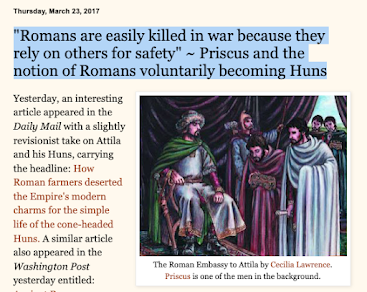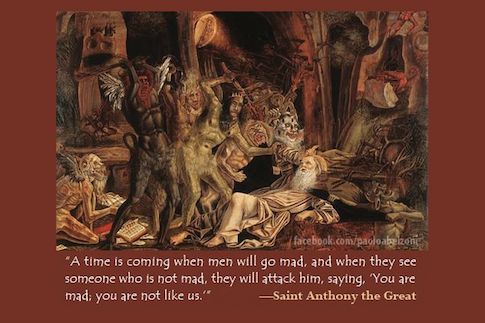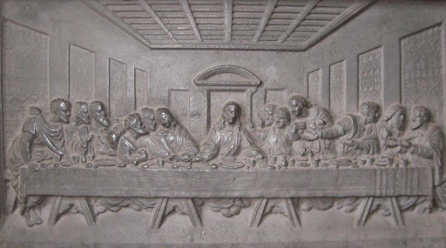 |
| Detail from The Massacre of the Innocents by Léon Cogniet, 1824. |
This event is recorded in the Gospel of Saint Matthew in connection with the arrival of the Magi – the Wise Men from the East – who had followed a star to Jerusalem, and had sought out the newborn king of the Jews. According to Matthew’s account, King Herod requested that the Magi return to him after finding the child, ostensibly so that Herod could join in worshipping the newborn King.
But the Magi were suspicious of Herod’s true motives. Matthew’s Gospel gives the account of what happened next:
“And having received an answer in sleep that they should not return to Herod, they went back another way into their country…. Then Herod perceiving that he was deluded by the wise men, was exceeding angry; and sending killed all the men children that were in Bethlehem, and in all the borders thereof, from two years old and under, according to the time which he had diligently inquired of the wise men. Then was fulfilled that which was spoken by Jeremias the prophet, saying: ‘A voice in Rama was heard, lamentation and great mourning; Rachel bewailing her children, and would not be comforted, because they are not.’” [Matthew 2:12, 16-18]
Matthew is alone among the evangelists in recording this event. There is also no non-Christian Roman, Greek, or Jewish historian who reports on it directly. As a result, the massacre has fallen under the skepticism of the modern era which views all early Christian sources as highly suspect. Indeed, there exists a tendency in some circles to consider any events recorded in Christian sources which are not corroborated by contemporary non-Christian sources as little more than hagiographic fantasies, interpolations or outright fabrications. Meanwhile non-Christian sources are not treated with anything like that kind of rigor.
As readers to this blog know, I tend to give early Christian writers the benefit of the doubt, and will even give late antique and early medieval writers latitude when they are discussing earlier events, as many of them are relating information from more ancient sources that were subsequently lost.
In the case of Herod's massacre of the children of Bethlehem, I see no reason why Matthew’s account shouldn’t be taken at face value. It is cited by Christian authors as early as Saint Justin Martyr, who mentions Matthew’s account in the mid-second century AD in his Dialogue with Trypho (Chapter 78). It’s worth noting that Trypho was a Jew and Justin was a convert to Christianity from paganism. While Trypho disputes much of what Justin says, it is not recorded that he disputed the historicity of Justin’s mention of Herod’s slaughter of the innocents.
A similar case may be found in Origen’s work, Against Celsus. Celsus was a pagan philosopher who wrote an anti-Christian polemic in the mid-to-late 2nd century AD entitled The True Word. Most of what we know about this work is contained in Origen’s response which was written in the mid-3rd century, and in which he quotes freely from The True Word. As a rhetorical device, Celsus puts some of his arguments into the mouth of a fictional Jew, and it seems fairly clear that Celsus had learned a considerable amount about the relationship between Judaism and Christianity from Jewish associates. Even so, Celsus retained a Hellenistic antipathy toward the Jews as he frequently held their practices up to scorn. We find a passage in Against Celsus, which discusses the massacre of the innocents, saying specifically that Celsus's fictional Jew did not believe that Herod had conspired against the infant Christ, nor that an angel had warned Joseph in a dream to flee into Egypt. (Against Celsus, Book 1: Chapter 61). Later in that same paragraph, however, Celsus assumes that this event did occur. He has his Jewish mouthpiece say to Jesus:
“But if [the massacre of the innocents] was done in order that you might not reign in [Herod's] stead when you had grown to man's estate, why, after you did reach that estate, do you not become a king?”
Of course, part of the reason Celsus must doubt that the massacre of the innocents took place is because he has his own thoroughly blasphemous alternate version of the infancy of Christ, the details of which “are frequently identical with those of the Talmud.” (Celsus ~ Jewish Encyclopedia, 1906)
Finally, we have perhaps the most interesting and obscure of all the ancient references to the massacre of the innocents. It is provided by the pagan writer Macrobius in the early 400s AD. This late Roman author penned a book of various anecdotes compiled on the occasion of the Saturnalia. In one passage, Macrobius provides a litany of jokes and clever sayings, including the following: “On being informed that among the boys under two years of age whom Herod had ordered to be slain in Syria, Herod’s own son had also been slain, Augustus said: “It is better to be Herod’s hog than his son.” This quip probably raises more questions than it answers. At the very least, Macrobius seems to have his facts scrambled given that Herod's son, Antipater, was an adult when he was put to death around the time of Christ's birth. What the quote does reveal is that even a late antique pagan like Macrobius was aware of the massacre of the innocents, an event that was most likely an accepted part of conventional knowledge among the Roman educated classes.
A point often mentioned to nullify the massacre is that the event is nowhere mentioned by the great Jewish historian of the 1st century AD, Flavius Josephus. As useful as he is in recording in detail the reign of Herod, it can not be expected that Josephus provides every detail. It has been pointed out by more than one scholar that Bethlehem was a small town with a likely population of less than 2,000 at the time of Christ's birth. The number of boys under age two was probably fairly small—perhaps 40-50 at the most. Considering the scale of some of the atrocities committed by Herod that Josephus does record, is it surprising that the butchery of 40-50 infants might pass unnoticed? A list of Herod's enormities may be found in the excellent article by Richard T. France, "Herod and the Children of Bethlehem," Novum Testamentem, Vol. 21, Fasc. 2 (Apr., 1979), pp. 98-120
 |
| Ciarán Hinds (right) accurately portrayed a paranoid and malevolent Herod the Great in The Nativity Story (2006). |
I tend to agree with the conclusion offered by Dr. France in the above mentioned article:
"The historical evidence, such as it is, suggests that the incident is not in itself improbable, but very much in keeping with what we know of Herod's reign. Among the more striking atrocities of that period, it was a relatively minor incident, which has understandably not left any clearly independent mark in the very selective records of Herod's reign."
Rather than being so quick to dismiss scriptural narratives as fabrications, we should at least apply to them the same credibility thresholds that we apply to other ancient sources.

















































